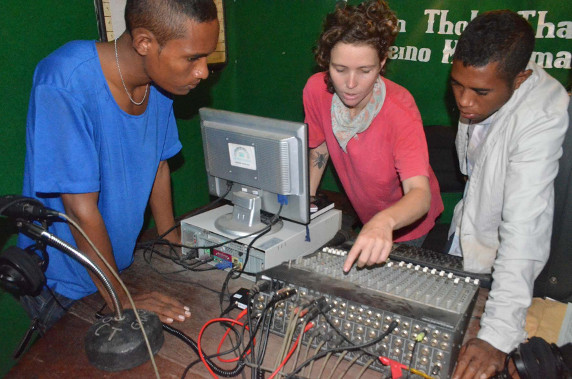Media
Smart design puts Timor talkback to air
Talkback is the backbone of Australian radio, and a group of Australian volunteers are working to help Timor-Leste’s community stations start their own conversations.
Melbourne radio producer Elena McMaster has recently returned home after a 12-month stint in Timor-Leste working with the country’s community radio association, Asosiasaun Radio Komunidade Timor-Leste (ARKTL).
There she helped to install equipment in the community-run stations to allow them to broadcast listener feedback directly on-air.
The new equipment also allows the stations to broadcast live crosses with journalists in the field.
 McMaster, who trained staff in the regional stations, said the development is an important one.
McMaster, who trained staff in the regional stations, said the development is an important one.
“It makes sense, especially in a place like Timor where a lot of people in the community listen to community radio,” she said. “These stations now have the ability to allow listeners to actually call up and comment on issues.”
McMaster’s work built on the support provided by two volunteer radio technicians, Michael Wasmund and Christopher Ross. They visited Timor-Leste in 2013 and advised of a need for special, yet simple, equipment to be developed.
Using a smartphone and a smartphone cable, they were able to connect the phone to a station’s mixer and broadcast conversations.
But smartphones were too expensive for the remote community stations so Melbourne-based 3CR community radio technician Riah Williams stepped in.
He built a simple device to connect cheaper, more readily available mobile phone handsets to a radio studio.
McMaster said the quick-to-install equipment works in Timor-Leste because the cost is reasonable.
“In Australia, radio talkback using a fixed landline is relatively cheap and produces a fairly good sound,” she said. “This is not the case in Timor where a fixed line can be expensive.”
In Maliana, southwest of Dili, the local community station was able to broadcast its first talkback program as soon as the equipment was installed.
“They were excited to be able to speak directly with listeners,” McMaster said.
Six community stations, including those in Baucau, Oecusse and Maubisse, are actively using the new equipment.
McMaster’s volunteer work was supported by Australian Volunteers for International Development (AVID), the Asia Pacific Journalism Centre and 3CR.
APJC director John Wallace said, ““For many years we’ve been working with communities in East Timor to help support their community radio stations and promote greater engagement.
“We see it is vital for the health of East Timor’s media, especially in remote areas of the country.
“This technology allows communities to become more involved in their local stations, and most importantly it gives them a platform to share their views and have a say about the society they live in.”
McMaster is now working again with 3CR as national programmer and a trainer.
Photo: Elena McMaster reviews mixer connections (to enable recording) with staff at Radio Cova Taroman in Suai. Photo courtesy of Joaquim De Fatima Coutinho and Zelia da Costa.